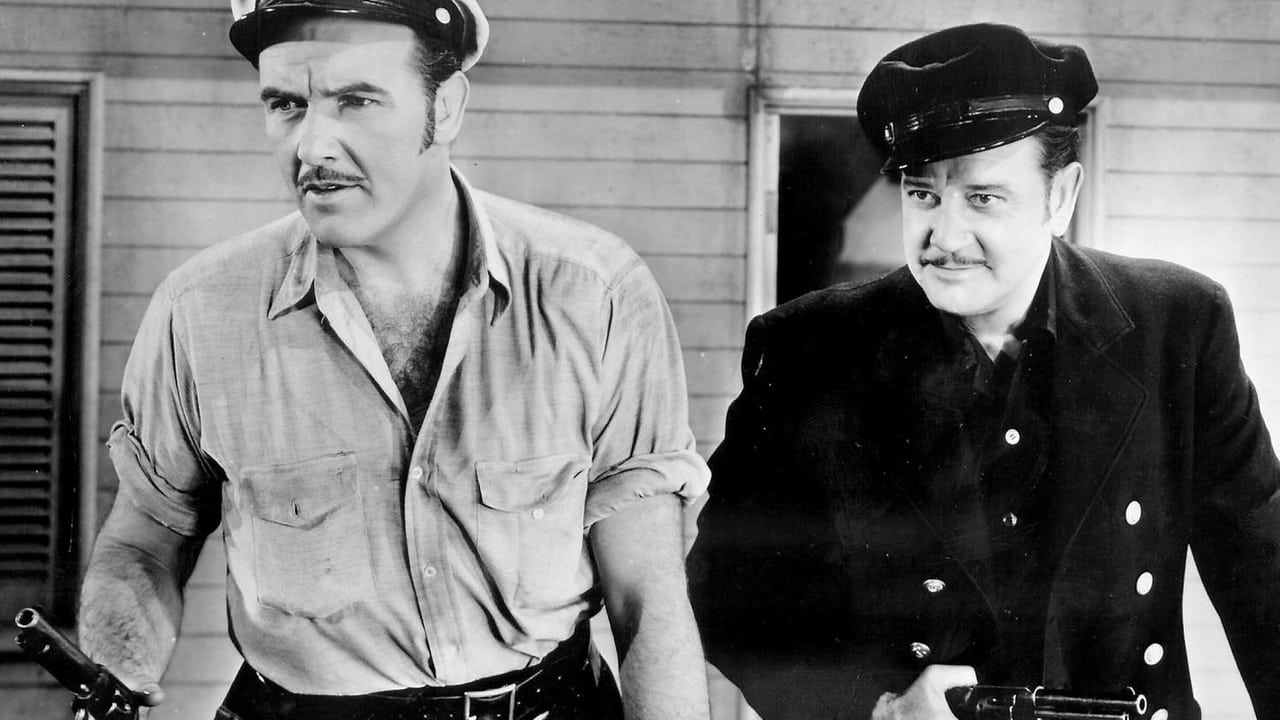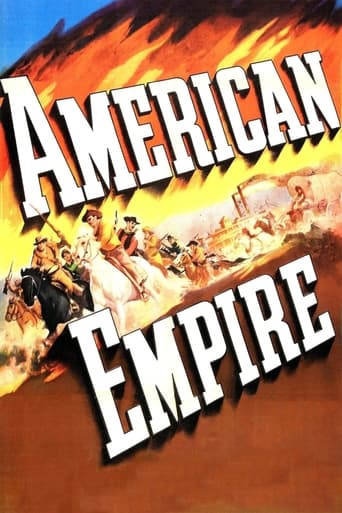

A Brilliant Conflict
... View MoreGood films always raise compelling questions, whether the format is fiction or documentary fact.
... View MoreThis film is so real. It treats its characters with so much care and sensitivity.
... View MoreA film of deceptively outspoken contemporary relevance, this is cinema at its most alert, alarming and alive.
... View MoreThere are buffs who signal American EMPIRE as an unusual and likable western; they are right about a degree of relative originality. Nicely paced, this flick is pretty well made. The plot isn't very interesting, and it's not an exciting and lively movie; but it looks better than the regular westerns of those times. I'm kind of a fan of this movie. As a genre, American EMPIRE isn't as a matter of fact a western, but a melodrama; a ranch melodrama.Gracelessly played by the two aging male leads (the distinguished and oldie Preston Foster and Richard Dix), this charming light ancient comedy manages, for a little while, before it quickly turns into romance, some kind of a screwball western—or western screwball; which would of been interesting to follow on, but, as I said, they traded screwball for romance. The action begins in the aftermath of the civil war. Two boatmen, Bryce and Taylor, turn into ranch-men. They sailed, they ride, now they have a cattle ranch. A sister for one of them means a lover for the other.Then we are, with our Texans, in 1874. Bryce (played by Preston Foster), now a family man and a powerful owner of cattle, has become a heartless guy; in his individualism, he even opposes progress as represented by the railroad, he believes only in the sharpest concurrency, he concedes nothing. Even his relatives resent him.Bryce's wife is played by the hot Frances Gifford, some girl .What is the American EMPIRE? Bryce's ranch.The scene of the firewall is awesome.The folks depicted in these naive ancient westerns are usually _asexualized, generous and decent, conventionally horny sometimes.The title of Cristian Ciopron's review should not mislead—the characters leave the river—for cattle, love and family—quite early in the movie.
... View MoreI'm sure that the folks on the Texas/Louisiana border must have had a a good laugh or two when Paramount's B picture unit inflicted this one on the war time public. Very simply the area along the Sabine River where the film opens is cotton country just like the rest of the Deep South or at least the Deep South was post Civl War. No big cattle empires there, they're much farther west in Texas, farther than Richard Dix and Preston Foster could ride to set up their empire.The film begins with the two of them partners in a riverboat and when Leo Carrillo tries a theft of their services by not paying them for hauling his cattle, they keep the cattle. And that's the beginning of the big Ponderosa like ranch they start.Along the way Foster marries Dix's sister played by Frances Gifford and feuds with his much smaller neighbors. They also have some further run ins with Leo Carrillo.Anyway, us easterners who like westerns usually don't bother with geographical trifles and it's still a good western from the production mill of Harry Sherman who produced all those Hopalong Cassidy westerns for Paramount. The climax is a blazing, and I mean that literally, gun battle that should have maybe been used on an A production.But I wouldn't have any but western fans look at it.
... View More"American Empire" is another of a series of modestly budgeted features produced by Harry "Pop" Sherman, who also was responsible for the highly successful Hopalong Cassidy series. This one deals with the emergeance of the cattle ranches in Texas in the years following the Civil War. Two soldiers of fortune, Dan Taylor (Richard Dix) and Pax Bryce (Preston Foster) are ruuning a freight business from their riverboat. One day they meet up with the unscrupulous Dominique Beauchard (Leo Carillo) who is driving cattle to his home state of Louisiana. The boys agree to transport the cattle to their destination for a set fee. When Beauchard fails to pay up they keep the cattle and decide to go into the cattle ranching business. Into the mix comes Taylor's sister Abby (Frances Gifford) with whom Bryce falls in love and marries. They soon have a son Pax Jr. (Merrill Rodin) and Pax Sr. becomes more and more ambitious as time goes on, much to the chagrin of his partner Dan. He has angered the smaller ranchers by refusing them permission to drive their cattle across his land. The ranchers decide to stampede the cattle through but Pax Jr. is killed in the stampede. Bryce becomes distraught and decides to erect barb wire fences around the ranch which forces Dan to dissolve their partnership. All this is resolved at the end when all realize that progress must prevail over the ambitions of one man. Also in the cast are Guinn "Big Boy" Williams and Cliff Edwards as the comic relief, Jack LaRue and Chris-Pin Martin as Carillo's henchmen, and veterans William Farnum and Hal Taliaferro in other roles. Foster is really the star of the movie despite being billed third. He delivers a solid performance. Dix, who was top billed, is really only a supporting player. Gifford looks lovely as the heroine. The action is well staged and there's one dandy of a gunfight at the climax of the film. A good western.
... View MoreGood action and an interesting story make this Western good entertainment despite a few minor flaws. The characters aren't very deep, but they're interesting, and the pace moves along very nicely as it builds up the tension and leads up to a good and often exciting climactic sequence. Richard Dix helps a lot with a pretty good performance as the key character.The story sets up a situation with a lot of possibilities. On the one hand is the hard-headed Bryce, head of the big cattle empire. Then there are the rest of the ranchers, whom Bryce has alienated and angered by his aggressive policies. Finally there is the wild card, the crafty rustler Beauchard, out only for himself. In the middle of all the conflicts is Dix's character Dan Taylor, trying to hold things together. As the story develops from there, Dix generally underplays to good effect (making a nice contrast with, for example, his better known but rather overblown performance in "Cimarron"), and lets the situation speak for itself when it should. Only some shallow characterizations and some ineffective comic relief hold it back a little at times. Otherwise, it gets pretty good mileage out of its potential, and has most of the things you could ask for in a Western.
... View More